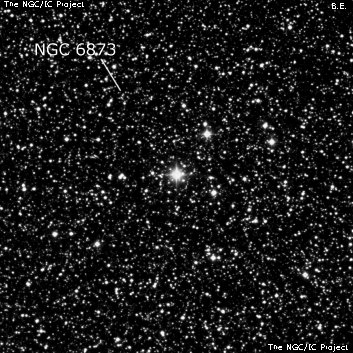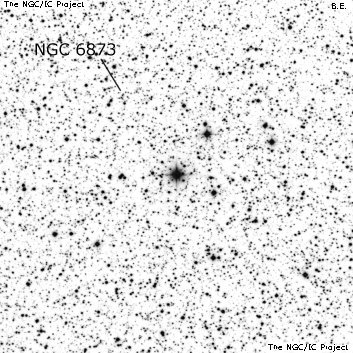NGC/IC Project Restoration Effort
(This is a very very beta version)
NGC6873


Basic Information
Location and Magnitude
Right Ascension: 20:7:13.0
Declination: +21:6:8
Constellation: SGE
Visual Magnitude:
Historic Information
Discoverer: Struve W.
Year of discovery: 1825
Discovery aperture: 9.6
Observational
Summary description: Cl, lC, st 10…13, ** inv
Sub-type: *Grp
Corwin's Notes
=====
NGC 6873. JH's position (and so GC and NGC) is 1 minute of time too large.
The correct position for Struve 2631 (the double star noted in the
description) puts it into the midst of a relatively rich Milky Way field. But
JH is right in calling it "... a coarse straggling group of stars 10...13m,
hardly entitled to be called a cluster." The grouping is approximately 13
arcmin x 10 arcmin with a center of gravity just south of the double very
close JH's position corrected by 1 minute in RA.
On the DSS2R image in February 2016, I make the cluster smaller (10' x 8'),
and put the center somewhat to the southeast of the double star. While I can
just make out the somewhat larger cluster that I mentioned earlier, it no
longer impresses me as much, so I would suggest a visual survey of the field
to find JH's object.
Steve's Notes
=====
NGC 6873
17.5" (8/25/95): fairly rich region but there is no noticeable clustering. There is a 15' string starting from the mag 10 star at the NGC position heading due west and ending at the bright double ·2631 = 8.4/9.8 at 4.6". This star is very possibly the double referred to in John Herschel's description with a 1.0 tmin error in RA -- Corwin concurs.
17.5" (7/7/94): the low power field (100x using 20 Nagler) surrounding the pretty double star Theta Sagittae = ·2637 (6.5/9.0 at 12") includes several bright stars but appears too sparse to be a cluster. But 5' NE of Theta is a neat elongated group of 15 stars mag 12-13 forming a "?" asterism about 6' in length. Theta Sagittae is located 1.7 tmin east and 11' S of Herschel's position so this identification is less likely than the one given above.



